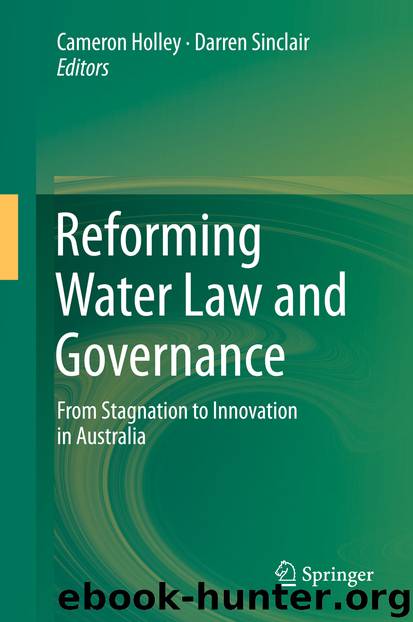Reforming Water Law and Governance by Cameron Holley & Darren Sinclair

Author:Cameron Holley & Darren Sinclair
Language: eng
Format: epub
Publisher: Springer Singapore, Singapore
3.1 Achievements of Water Markets
Better and More Flexible Responses to Past and Future Droughts As discussed above, one of the primary benefits of markets over top down command and control approaches is that they can coordinate local knowledge in ways that can flexibly react to changing circumstances and risks (Karkkainen et al. 2000). A number of interviewees recognised these benefits, confirming that the decentralised market mechanism had enhanced the capacity of individuals to have a say over water management: ‘[markets] actually give community and public interest constituencies direct control over water resources to get public interest outcomes’ (Interview V0, NGO). This in turn was reported to have contributed to greater flexibility in the water communities’ response to drought: ‘when we started that drought, the irrigator didn’t have a lot of say in how they could affect their own security. They do now with the carryover rules and as the market’s got more developed, its expanded the tools you can use…I think we’re better placed now than we’ve ever been to face a 2002 again’ (Interview V8, Farmer).
Similar points have been drawn from economic modelling and research on water markets, which have found that the ability to trade water has been critical in maintaining irrigation sector incomes during drought (Wheeler et al. 2014a, b, c). For example, Wei et al.’s study suggests water trading played a key role in responding to the 2006–08 dry periods, including rates of around 20–31% of farmers either buying or selling water during these periods (Wei et al. 2011). Available modelling also suggests that the market provides significant adaptation opportunities for farmers under mild to moderate future climate change scenarios (Wheeler et al. 2014a, b, c). Government interviewees confirmed this belief, pointing out that a market (as opposed to central administration) was the best mechanism for responding to times of scarcity: ‘If there is less available…it gets harder to adapt and take into account new values and new benefits if it is not done through the market’ (Interview V9, Government).
Market Efficiencies Produce Economic and, to a Lesser Extent, Environmental Benefits for Individuals and Regions A number of respondents argued putting a price on water and enabling its trade had ensured much greater efficiencies in the use of water: ‘It’s the ability of water to be able to go from the low value use to high value use and that’s really changed practices and made the biggest success’ (Interview V8, Farmer). As another respondent explained: ‘the main success of it all has been the water tradability which really allows water to find its highest value. We can trade high flow now…We can now, with difficulty, trade inter State. But what it allows people to do is find the highest value for their water. Instead of wasting water on running cows or something, it’s all heading to the highest value. So each ML is producing the most earning’ (Interview Q3, Farmer).
These efficiencies produced substantial economic benefits, both for agricultural communities and individual farmers. At the community level, markets
Download
This site does not store any files on its server. We only index and link to content provided by other sites. Please contact the content providers to delete copyright contents if any and email us, we'll remove relevant links or contents immediately.
The Pirates of Somalia by Jay Bahadur(1640)
Political Theology by Carl Schmitt(1585)
The Holocaust: A New History by Laurence Rees(1526)
The Social Animal by David Brooks(1459)
A Practical Guide to International Arbitration in London by Hilary Heilbron(1440)
Restitution by Restitution(1427)
Pirates of Somalia by Jay Bahadur(1386)
Coercing Virtue by Robert H. Bork(1359)
The Nuremberg Interviews by Leon Goldensohn(1307)
Basic International Corporate Taxation by Sebastiano Garufi(1218)
A History Of Thailand by Baker Chris(1196)
International Trade and Business: Law, Policy and Ethics by Gabriël Moens & Peter Gillies(1152)
The Global Commons by Susan J. Buck(1140)
Blood Profits by Vanessa Neumann(1121)
Asian Waters by Humphrey Hawksley(1116)
The Sovereignty of Human Rights by Macklem Patrick(1114)
Spring Fever: The Illusion of Islamic Democracy by McCarthy Andrew C(1110)
The Nuremberg Trials: The Nazis and their Crimes Against Humanity by Roland Paul(1054)
Crimes Against Humanity: Historical Evolution and Contemporary Application by M. Cherif Bassiouni(1030)
